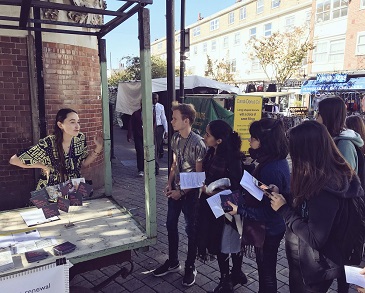Student profile: Zaina Alisha Ali
First-year Human Geography student Zaina Alisha Ali recently met with senior members of the council Waste Management Team at the London Borough of Tower Hamlets to report back on research carried out on single-use plastics on Roman Road as part of the School of Geography’s ‘Green London’ induction fieldwork class.

Students conducting plastic audit in Roman Road Market. © Stephen Taylor
What do you study at Queen Mary and what year you are in?
I am in my first year at Queen Mary and studying BA Human Geography.
Tell us about what you got up to during the ‘Green London’ induction week and what impact this had on the local area/public.
During the Green London fieldwork week, we explored London and its pockets of nature while investigating how natural spaces and wildlife shape the city as a whole. In particular we worked with Roman Road Trust helping them gather data from businesses along Roman Road about their consumption of single-use plastics. The results gathered from this were intended to encourage businesses and high authorities like the Council to make Roman Road more sustainable.
Were there any interesting findings from your research?
We found that the most-consumed plastic items by customers across the majority of businesses were plastic bags! Most shops were open to the idea of going plastic-free but were concerned that doing this could affect their revenue. Most interestingly, a sweet shop owner whose packaging is plastic-dominated was equally as motivated to go plastic-free. One of the ideas discussed in the meeting with the Council was for business owners to get together and share ideas for how going plastic-free may benefit them and may not result in a loss of profit.
You met with senior members of the council Waste Management Team at the London Borough of Tower Hamlets – tell us about that!
This was really exciting for me because not only did it allow my voice to be heard as a representative of Queen Mary but it also showed me how policies were made and the steps that needed to be taken to get there. This meeting involved a variety of people including Roman Road Trust representatives, two Council members and also residents of the local area. Stephen Taylor, Lecturer in Human Geography at Queen Mary, spoke about our findings from the fieldwork week which was used as a basis for the meeting leading onto ideas for what we could do to initiate this plastic-free scheme. The Council seemed passionate about the project and suggested follow-up meetings to ensure that action is taken place. I think with the funding from the Council (if approved), Roman Road Trust could make some big inspiring changes!
What’s the biggest thing (or something learnt) that you will take away from this experience?
I think it taught me that no matter how small an idea may be, the impact that it may have on the community is what matters. Initially I didn’t believe that London could be a national park but after the fieldwork that was conducted and the talk that was given by Daniel Raven-Ellison, I think it is a great idea and it could definitely happen in the future.
Have you ever taken part in any fieldwork such as this before?
My A-Level coursework title was based on plastics and how it affects the environment. Within this, I took a trip to Bournemouth Beach to collect data regarding the number and type of plastic items that were found in a randomly selected area. It highlighted just how much plastic is thrown into the water on a daily basis affecting not only the pristine image of a beach but, more importantly, the marine ecosystem.
Do you have any other successes or information that you would like to share with us?
In the last few years I have spent my time working with various charities in the hope of giving back to those who are less fortunate. I also had the opportunity of climbing Ben Nevis and Mount Snowdon to raise money for two different charities. Within the coming years, I also hope to climb Mount Kilimanjaro!